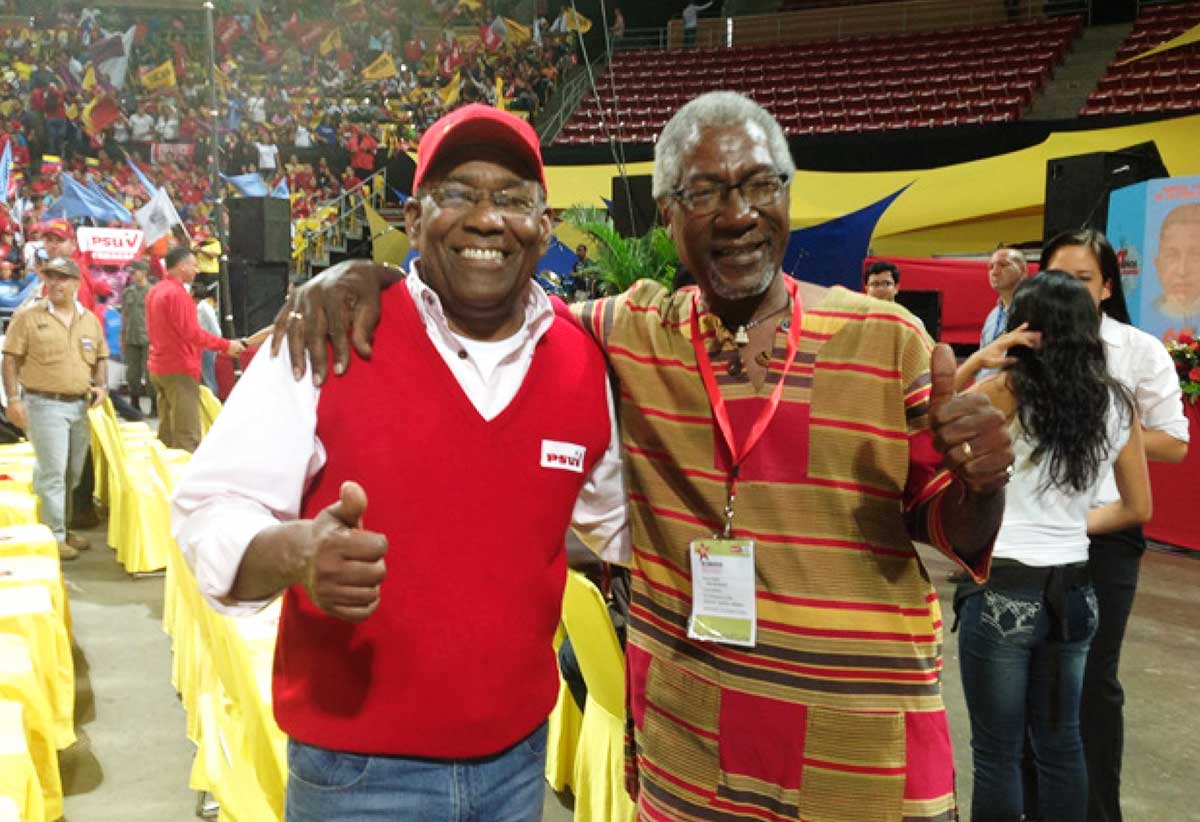
I WAS quite taken aback — in pure Shock and Awe, like all who knew him — when I heard my friend AristobuloIstruiz, Venezuela’s most popular Afro Venezuelan leader, had died from a massive heart attack on April 27, aged 74.
I’d first met ‘The Professor’ (as he was known throughout his life) with a group of Caribbean journalists at a giant oil PDVSA depot in Venezuela in 2016.
Our itinerary for the day included ‘a discussion’ with ‘the Governor of Anzoategui State’ — and when we saw who emerged from the state car with the heavy security detail, I could have seen and felt the common expression of silent but very welcome surprise that he looked just like us.

Indeed, his every single word impressed every member of the visiting delegation of English-speaking Caribbean Community (CARICOM) neighbors, impressed by how he spoke and the verve with which he delivered every translated sentence.
He provided the visiting Caribbean press corps off-the-cuff details about how and why Venezuela had to protect its oil reserves from continuing plunder by American oil companies and their local cohorts and enablers; and offered facts and figures with the speed of light as he outlined the numerous times PDVSA’s US subsidiary CITCO had been to the assistance of poor Americans in times of distress, whether following Hurricane Katrina or simply to provide heat after being disconnected by the US companies.
His statistics on Venezuela’s educational achievements since the Bolivarian Revolution led by Hugo Chavez in the 21st Century were also simply amazing, he having led the national effort at eradicating illiteracy between 2001 and 2007, leading to UNESCO’s designation of Venezuela as an ‘Illiteracy Free Territory’ in 2005.
‘The Professor’, he later moved on up from being a Governor to Vice President for Territorial Socialism and Education.
We met again at the 3rd Congress of the United Socialist Party of Venezuela (PSUV) in 2017; and again two years later in 2019, when he returned to head the Education Ministry.
In 2020, Istabulo launched a national campaign to take classes to students under COVID Lockdown through a radio and TV program called ‘A School in Every Family’.
We last exchanged brief words and waves at two international solidarity rallies in Caracas in 2017 to support Venezuela’s right to determine its destiny and chart its own political course.
We discussed Venezuela-Caribbean ties each time we met.
I remember telling him about our (then still) Governor General Dame Pearlette Louisy and her similar lifelong commitment to education; and the contribution of Dr Didacus Jules to leadership of the National Literacy Project in Grenada during the Revolution, when he served as Permanent Secretary in the Education Ministry, later moving on to head the Caribbean Examinations Council (CXC).
He was quite interested in the way Dame Pearlette promoted our indigenous Kweyol language ‘with Royal Assent’ in all her 20 Throne Speeches as representative of Queen Elizabeth II, Saint Lucia’s constitutional Head of State.
And he would ‘share notes’ with Dr Jules, if they met, on the Grenada and Venezuela experiences of eliminating illiteracy with Cuba’s help.
And he would enjoy ‘living my vision of driving around Saint Lucia and meeting ordinary people without sirens and outriders…’
But none of that was to be…
On April 27, I heard Aristobulo had died.
He was already buried under COVID protocols, but was also highly and duly honored with the Order of The Liberators, symbolized by a suitable replica of Simon Bolivar’s sword.
‘The Professor’ was someone you could actually feel without touching.
He oozed a perennial confidence that connected with the rapidity and weight delivered by a man of many words who didn’t mince any when it came to making the points that matter to the future of Venezuela’s poor, protection of its vast natural and human resources and defense of its sovereignty.
Born in Curiepe in 1946, Istruiz was Councilman of the Libertador municipality in the 1990s and became Mayor of Caracas in 1992 with Chavez’s support; and in 1999 he was elected to the National Constituent Assembly (ANC), which changed the Venezuelan Constitution and created new power structures.
A proud representative of and example to the 10% of Venezuelans of African origin, he was the first Afro-Venezuelan Vice President and seen across America as the Black face of the Bolivarian Revolution.
But he served all his people and stamped his brand on the nation’s education achievement under both presidents Chavez and Maduro.
Ever effervescent and bubbling with enthusiasm at a podium or with a microphone in hand, Istruiz spanned five different political organizations he formed before joining Chavez in the PSUV, taking with him decades of practical experience that would do well to harness the popular support that helped the Chavista movement win 22 out of 24 national elections since 1998.
He offered practical advice too to Maduro, who, himself also a former bus driver, trade union leader and political organizer, allowed ‘The Professor’ to unleash all his energies in the education sector.
AristobuloIstruiz always kept his eyes on the prize and often guided younger leaders in how to properly assess the capacity and will of those bent on overthrowing Maduro and reversing the process.
He understood (better than many) the intrinsic link that Bolivar developed with like minds in the neighboring Caribbean islands, including Saint Lucia’s Jean Baptiste Bideau, a shipwright who plied men and supplies for the independence fight through Trinidad & Tobago’s Gulf of Paria.
He supported Presidents Chavez and Maduro’s honest outreach to the English-speaking Caribbean, but just didn’t live long enough to see its fruitful fruition in the ways he and they envisioned.
Aristobulo will always be one of the most impressive Caribbean politicians I ever met.












